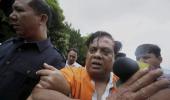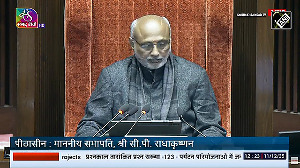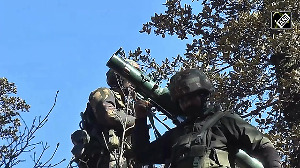'The list of betrayals is long.'
'People, who said they were like family, have backstabbed me most.'

Jigna Vora, the journalist on whose book -- and ordeal -- Hansal Menhta's thrilling Web series Scoop is based on, is still trying to rebuild her life.
Vora had been arrested in connection to journalist J Dey's murder in 2011, and she was released from prison in 2018 with a clean chit.
But the damage to her life and career was already done.
As Karishma Tanna attempts to play out her life in Scoop, Jigna tells Subhash K Jha, "I was acquitted in 2018, but when I apply for a job, I get told that HR has a policy of not hiring a person with a criminal record. Where do I go? What do I do?"
Have you seen Hansal Mehta's stunning series on your traumatic experience in prison? How closely were you associated with it?
I haven't seen the whole series yet.
Whatever I have seen, I'm really taken aback that Hansal Mehta has adapted my book Behind Bars In Byculla: My Days In Prison. It will be an eye-opener and relatable to many women like me, who are struggling in male-predominated fields.

What did you think of Karishma Tanna playing you?
Karishma has done a fabulous job. She resembles me to great extent.
Watching the series, I often wondered why you were chosen to be the Fall Girl in the J Dey murder case.
Twelve years down the line, believe me, this question is still haunting me.
I want to know why me.
During the early days in jail, I kept wondering what I have done wrong to be here. Gradually, I accepted the situation.

One can't even begin to imagine the trauma you went through. In your darkest hour, where did you find your strength?
Faith in God, my family and karma.
If you have read my book, I have written I use to chant the Hanuman Chalisa continuously, maybe 300 to 400 times a day. It gave me immense strength.
And yes, I have seen miracles too.
The series shows almost all your media colleagues, except your incredibly supportive editor, turning against you. What do you have to say about the lack of solidarity within your fraternity?
Yes, this hurts more that the media didn't even spare me. This question should be ideally asked to the media.
The series shows you had a very supportive family, but a treacherous boyfriend. How did you cope with the betrayals?
It's said, na, tough situation shows the real faces.
I came to know many of the real faces during the last 12 years.
The list of betrayals is long.
People tried to take advantage of the situation and my vulnerability.
People, who said they were like family, have backstabbed me most. They capitalised on my life.
Once during my reporting days, a senior IPS officer had told me, 'Jigna, there are all vultures out here.'
And I experienced this. I have learned my lessons the hard way.

Now that you have your freedom again, what are you doing with it? Has the healing and rehabilitation been tough?
What freedom are you talking about?
I was acquitted in 2018, but I still live in constant fear.
I have no job in hand.
There is the everyday struggle, the struggle with self.
Yes, I have healed myself to a great extent by doing Vipassana and meditation.
I have forgiven many people.
What is your advice to all those journalists who tend to cross the line in the quest for scoops?
I think today's journalists are smart enough. They know what they have to do.
Finally, your struggle and victory in proving your innocence is highly inspiring. What do you have to say about the thousands of undertrials languishing in jail for crimes they have not committed?
Every undertrial has a backstory.
We, as a society, should try to understand this and help them by counseling and channelising their destructive energies in positive way.
Even now when I apply for a job, I get told that HR has a policy of not hiring a person with a criminal record.
Where do I go?
What do I do ?
I was fortunate that my family was there to take care of my son and me financially and mentally. They stood like a rock.
As a society, we should have corrective programmes designed for undertrials.











